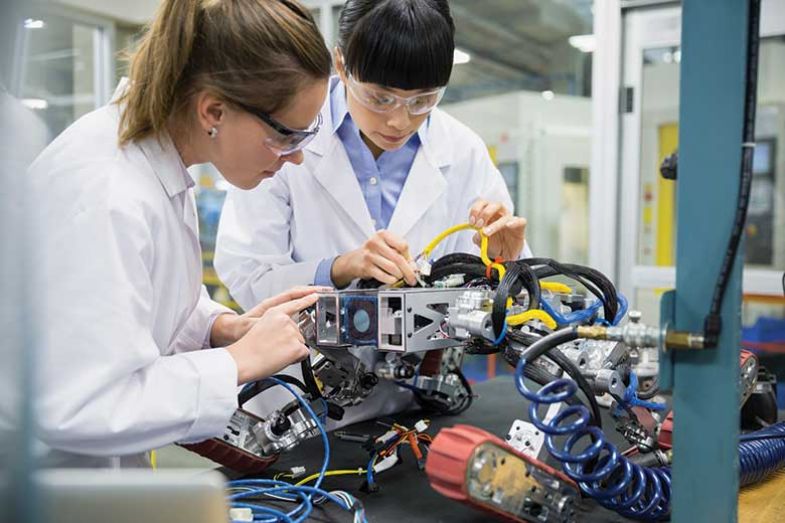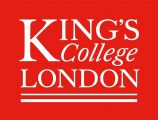
Source:
King’s College London

King’s College London’s department of engineering is hiring academics with an emphasis on cross-disciplinary collaboration
In a world in which society faces complex, fast-evolving challenges, engineering will play a key role in finding the solutions that will design our future. How to care for an ageing population, make a nation’s energy mix sustainable, make transport and communications more efficient and deliver the next iteration of the internet are among the issues facing us that engineering can help resolve, and are what the department of engineering at King’s College London was created to address.
The department of engineering at King’s operates out of the university’s Strand campus and is headed by Barbara Shollock. To accommodate the department’s growth, King’s is redeveloping its historic Quad building, refurbishing empty space that can be used for state-of-the-art classrooms and laboratories. The names and faces of famous alumni decorate the exterior walls of its Strand-facing estates, so commuters cannot help but be aware of King’s’ academic legacy. And yet, while Professor Shollock salutes titans such as James Clerk Maxwell and Charles Wheatstone as pillars of the university’s legacy achievements in engineering, she sees her new department as resolutely forward facing.
“We are really quite lucky, in a way, to build this on this engineering legacy,” she says. “What we are doing is bringing together engineering disciplines into one department where we can exploit those synergies and can integrate them to not only educate engineers but also to look at modern problems in a new way.”
Professor Shollock identifies the interaction between different disciplines and departments as one of the university’s strengths. Cross-disciplinary collaboration happens naturally and these interactions are crucial to engineering research.
The department of engineering will exploit the synergies between disciplines that occur across its faculties. “The great thing about King’s is that it is a very integrated university,” says Professor Shollock. “There is a very free flow of ideas and collaborations, not only between the departments of one faculty but also between faculties.
“We have a new colleague in the department who is a mechanical engineer who works on wildfires – and King’s’ geography department is a partner in the Leverhulme Centre for Wildfires,” she says. “So we are now able to link with geography to bring in a technical understanding. We also now have the modelling work so we can come up with a holistic solution to some of the real challenges the world is facing.
“There are so many possibilities for drawing in the right group of experts to either integrate with other universities or industry, or to internally build up some new ideas,” she adds.

At King’s, the Entrepreneurship Institute supports students, staff and alumni in their entrepreneurial activities. Professor Shollock says that it is vital that once solutions are created in the academic space, there is a route for them to be exploited fully and to drive progress. “To do that, we need to engage with either government or industry to pull those solutions [out], and optimise and develop them,” she explains.
Similarly, its engineering students need to be able to deliver solutions once they graduate – and this is key to the department’s teaching mission. Whether students pursue a PhD or enter industry upon graduating, they will leave with an appreciation of how their engineering knowledge can be applied in real-world contexts. “What we are trying to do in our pedagogy is to recognise that, without a doubt, you need the core engineering knowledge,” says Professor Shollock. “But what you also need to do is to try to understand how to work with other engineers, whether they are in the industry or they are your PhD supervisor, so you can come together and understand the problem in order to present a range of solutions. In other words, to analyse the problem and apply your fundamental engineering knowledge, and then deliver an integrated solution.
“They need to understand a little of the broader sense, whether in a legal sense – how that solution might look within a legal framework – or how it might work in a policy framework, or in an environmental framework,” she says.
The department of engineering’s courses are structured around project-focused learning. Students are first given a thorough grounding on fundamentals, such as computer-aided design or programming, before being put to work in pairs or larger groups. “They could be working on problems given to us by industry or they could be building things for schools,” explains Professor Shollock. “We are going to give them a wide range of problems, from industrial to more general societal problems, and more specific engineering-focused tasks.”
Educating the engineers of tomorrow requires talent. New and prospective hires at the department of engineering at King’s all share a passion for engineering education and research, with a view to developing their work around what Professor Shollock describes as the “whole engineer” approach. The next generation of engineers will be problem solvers and could come from any field, as long as they have an aptitude for mathematical analysis.
This applies to researchers, too, with King’s hiring outside of mainstream engineering. “One of our recent hires has a first [class degree] in biology,” says Professor Shollock. “She is applying that to looking at new food sources – Quorn, for example – and how to design the systems to produce these sorts of new foodstuffs.”
This dovetails with the university’s wider mission: to change mainstream engineering. Its research into the concept of a tactile internet could alter how we do business and engage with people over distance. Autonomous robotics could revolutionise social care. Can we extract value from food waste?
These are just some of the areas in which engineering can transform our lives – and Professor Shollock is enthused that King’s is ideally placed to help deliver such innovation. “We are looking for people who are as excited about this as we are,” she says. “We are really privileged to have this opportunity.”
To find out more, search “King’s” on THEunijobs.com






